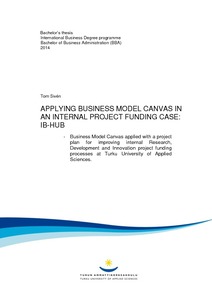Forecasting Project Performance : Testing Earned Value Management and Earned Schedule metrics using real life project data
Sarjos, Lauri (2021)
Sarjos, Lauri
2021
All rights reserved. This publication is copyrighted. You may download, display and print it for Your own personal use. Commercial use is prohibited.
Julkaisun pysyvä osoite on
https://urn.fi/URN:NBN:fi:amk-2021053012562
https://urn.fi/URN:NBN:fi:amk-2021053012562
Tiivistelmä
Projects in the construction industry struggle to meet set goals. This is especially true in long term projects where distress is often noticed too late in project completion. The purpose of this study was to find and test metrics that support forecasting project performance. The research questions was: Do met
rics identified by current research support project performance forecasting when validated by real life project data? The theoretical framework for this research was based on the Earned Value Management and Earned Schedule approaches. The basic principles and usefulness of Earned Value Management
and Earned Schedule approaches were discussed. In addition, metrics that support project progress and performance forecasting were covered. Nine projects were chosen as the sample for this study. The data for this study was gathered
from a project database and project documentation library. A quantitative, reductive approach was used in the empirical part to reduce the data into more interpretative form. Reduction was done by calculating the Earned Value Management and Earned Schedule metrics using the gathered data. For Earned Value Management project cost forecasting metrics, the results of this study did support the conclusions of the current literature. Earned Value Management metrics provide a valuable tool for the project manager to evaluate project’s current cost performance as well as estimate project’s total costs at the end of the project. The findings of this study suggest that Earned Schedule metrics as such do not recognize project work that is irregular during a project’s life span.
This can lead to too positive outlook for the project schedule. This does not mean that the Earned Schedule metrics are useless; the metrics or the way real life project data is used could be adjusted for this kind of project work in order for the metrics to provide valuable information.
rics identified by current research support project performance forecasting when validated by real life project data? The theoretical framework for this research was based on the Earned Value Management and Earned Schedule approaches. The basic principles and usefulness of Earned Value Management
and Earned Schedule approaches were discussed. In addition, metrics that support project progress and performance forecasting were covered. Nine projects were chosen as the sample for this study. The data for this study was gathered
from a project database and project documentation library. A quantitative, reductive approach was used in the empirical part to reduce the data into more interpretative form. Reduction was done by calculating the Earned Value Management and Earned Schedule metrics using the gathered data. For Earned Value Management project cost forecasting metrics, the results of this study did support the conclusions of the current literature. Earned Value Management metrics provide a valuable tool for the project manager to evaluate project’s current cost performance as well as estimate project’s total costs at the end of the project. The findings of this study suggest that Earned Schedule metrics as such do not recognize project work that is irregular during a project’s life span.
This can lead to too positive outlook for the project schedule. This does not mean that the Earned Schedule metrics are useless; the metrics or the way real life project data is used could be adjusted for this kind of project work in order for the metrics to provide valuable information.
Kokoelmat
Samankaltainen aineisto
Näytetään aineisto, joilla on samankaltaisia nimekkeitä, tekijöitä tai asiasanoja.
-
Project management in practice : Evaluating a case project through project management theories
Uusitalo, Jenni (Metropolia Ammattikorkeakoulu, 2013)The purpose of this thesis was to evaluate a case project and to study whether it was carried out in a correct manner; meaning that did the case project follow the project management models. In addition, part of the study ... -
I want to be a good project manager : Requirements to be a project manager in the context of multinational IT projects
Dmitrieva, Darja (Tampereen ammattikorkeakoulu, 2012)The main purpose of this thesis is to describe management methods and tools for multinational IT projects. All conclusions are based on the research, when few cases were studied and analyzed. Those cases are IT projects, ... -
Applying Business Model Canvas in an internal project funding case: IB-HUB : Business Model Canvas applied with a project plan for improving internal Research, Development and Innovation project funding processes at Turku University of Applied Sciences
Sivén, Tom (Turun ammattikorkeakoulu, 2014)During the past few years, internal projects were launched at Turku University of Applied Sciences at a growing rate. One of these internal projects has been IB-HUB, which brought the idea of improving the internal Research, ...



